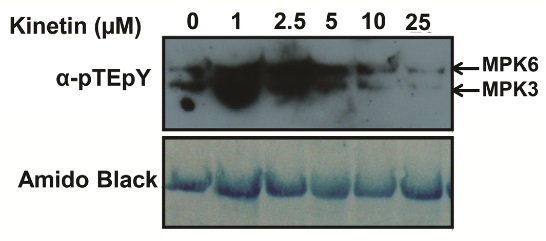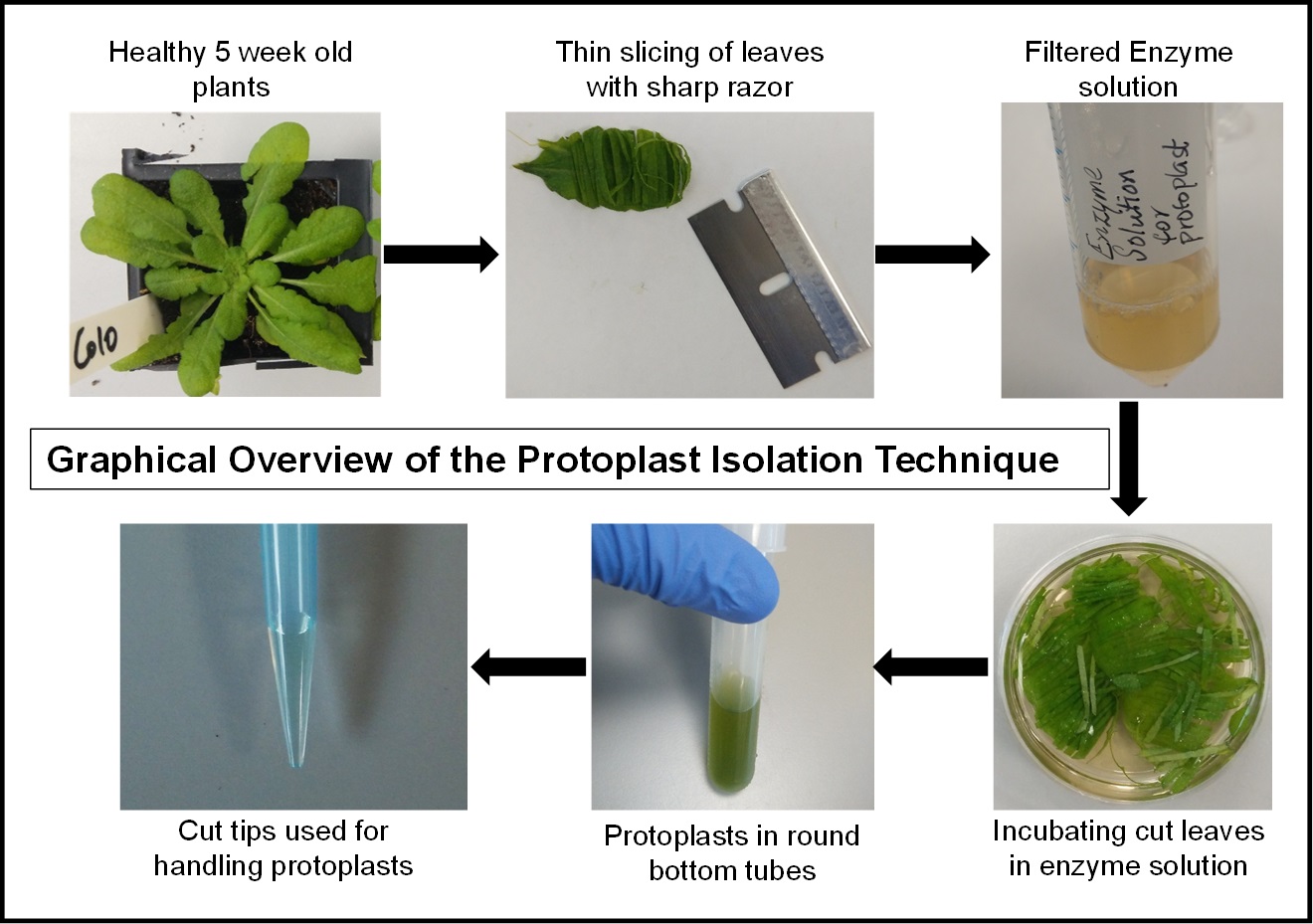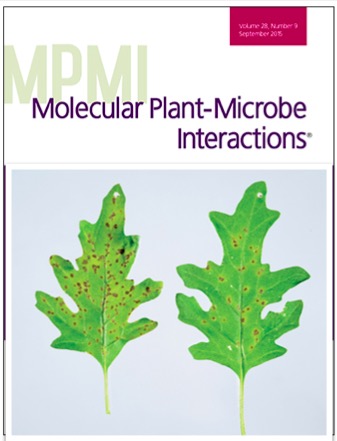- Submit a Protocol
- Receive Our Alerts
- Log in
- /
- Sign up
- My Bio Page
- Edit My Profile
- Change Password
- Log Out
- EN
- EN - English
- CN - 中文
- Protocols
- Articles and Issues
- For Authors
- About
- Become a Reviewer
- EN - English
- CN - 中文
- Home
- Protocols
- Articles and Issues
- For Authors
- About
- Become a Reviewer
Detection of Mitogen-activated Protein Kinase (MAPK) Activation upon Exogenous Chemical Application in Arabidopsis Protoplasts
Published: Vol 5, Iss 18, Sep 20, 2015 DOI: 10.21769/BioProtoc.1588 Views: 12372
Reviewed by: Zhaohui LiuArsalan DaudiAnonymous reviewer(s)

Protocol Collections
Comprehensive collections of detailed, peer-reviewed protocols focusing on specific topics
Related protocols

In vitro Auto- and Substrate-Ubiquitination Assays
Hye Lin Park [...] Gyeong Mee Yoon
Apr 5, 2022 3516 Views

Measuring in vitro ATPase Activity with High Sensitivity Using Radiolabeled ATP
Sarina Veit and Thomas Günther Pomorski
May 20, 2023 2273 Views

A Semi-throughput Procedure for Assaying Plant NADP-malate Dehydrogenase Activity Using a Plate Reader
Kevin Baudry and Emmanuelle Issakidis-Bourguet
Aug 20, 2023 1465 Views
Abstract
The mitogen activated protein kinase cascade is a highly conserved signal pathway in plants. The exogenous chemicals, like hormones, can trigger a series of signalling cascades, including MAPK pathway, to modulate the plant physiology. Upon activation, some MAPKs are phosphorylated. It is important to develop methods that can detect changes in the phosphorylation status of MAPKs in plants when they come in contact with external chemicals. This method describes the exogenous treatment of Arabidopsis protoplasts with Kinetin and subsequent detection of the activated MAPKs. This method is useful for studying the effect of exogenously applied chemical compounds on the MAPK signaling cascade in Arabidopsis.
Keywords: MAP kinaseMaterials and Reagents
- Plants: Arabidopsis thaliana (Col-0) obtained from NASC The European Arabidopsis Stock Centre
- Sodium chloride (NaCl) (Carl Roth, catalog number: 3957 )
- MgCl2 (Thermo Fisher Scientific, catalog number: M35 )
- CaCl2 (Thermo Fisher Scientific, catalog number: C69 )
- Potassium chloride (KCl) (Sigma-Aldrich, catalog number: P9541 )
- D-Mannitol (Sigma-Aldrich, catalog number: M4125 )
- MES hydrate (Sigma-Aldrich, catalog number: 8250 )
- Albumin bovine modified Cohn Fraction V, pH 7.0 (BSA) (SERVA Electrophoresis GmbH, catalog number: 11943 )
- Macerozyme ONOZUKA R10 (Yakult Pharmaceutical Industry Co)
- Cellulase ONOZUKA R10 (Yakult Pharmaceutical Industry Co)
- Kinetin (Sigma-Aldrich, catalog number: K3378 )
- Phospho-p44/42 MAPK (ERK1/2) Antibody (pTEpY Antibody) (Cell Signaling Technology, catalog number: 9101 )
- PierceTM ECL Western Blotting Substrate (Thermo Fisher Scientific, catalog number: 32109 )
- Protein free blocking solution (PFBS) (Thermo Fisher Scientific)
- 0.45 µm acetate filter (Carl Roth, catalog number: AH53.1 )
- Petri Dishes (Greiner Bio-One GmbH, catalog number: 628103 )
- Nitrocellulose Hybond ECL membrane (GE Healthcare, Amersham biosciences®, model: RPN82D )
- Stock solutions (see Recipes)
- Enzyme solution (see Recipes)
- W5 solution (see Recipes)
- WI solution (see Recipes)
- 0.5 mM mannitol (see Recipes)
- Kinetin (see Recipes)
- 1 L transfer buffer (see Recipes)
- 1 LTBST (Tris-Buffered Saline and Tween 20) (see Recipes)
- 5x SDS-Loading buffer (see Recipes)
- 10% SDS-PAGE gel (see Recipes)
Equipment
- Phytochambers or light room or greenhouse (23 °C, 16 h dark / 8 h light)
- Sharp razor blades (Carl Roth, catalog number: CK07.1 )
- Polycarbonate dessicator (Carl Roth, catalog number: PK30.1 )
- Nylon Net Filter, Hydrophilic (100 µm, 25 mm) (EMD Millipore, catalog number: NY1H02500 )
- Round bottom 12 ml cell culture polystyrene tubes (Greiner Bio-One GmbH, catalog number: 163160 )
- Swing bucket refrigerated Centrifuge (Eppendorf, model: 6810R )
- Haemocytometer
- SDS-PAGE gel running apparatus (Bio-Rad Laboratories)
- Semi-dry blotting apparatus (Bio-Rad Laboratories)
Procedure
- Arabidopsis protoplast isolation and chemical treatment
- Choose five week old and well-expanded leaves for protoplast isolation. Use a fresh sharp razor blade to cut <0.5 mm leaf strips and transfer them into the freshly prepared filtered enzyme solution (see Recipes for enzyme solution preparation) (around 20 leaves in 10 ml). Dip them completely into the solution by using a pair of flat-tip forceps. 20 leaves should yield 8-10 ml protoplast suspension for the assay (2 x 105 protoplast/ml). The general outline of protoplast isolation technique is shown in Figure 2.
- Vacuum-infiltrate leaf strips for 30 min in the dark using a desiccator (covered with a black cloth to prevent any possible effect of light on protoplast).
- Continue the digestion, without shaking, in the dark for at least 2.5 h at 20-22 °C.
- Gently shake the enzyme solution for 30 min on a lab shaker at 70-100 rpm at room temperature to release the protoplasts (solution should turn green and at least half of the leaf strips should become transparent). Add 10 ml W5 solution per 10 ml enzyme solution.
- Carefully filter suspension through a nylon mesh (100 µm) into 12 ml cell culture tubes on ice.
- Centrifuge the protoplast suspension for 1 min at 200 x g (4 °C) and remove as much supernatant as possible using a narrow bottom 5 ml tip.
- Add 2 ml of W5 solution to the tubes and resuspend the protoplast by gently inverting the tubes.
- Invert tube and immediately take 8 µl to determine protoplast concentration with haemocytometer. Dilute the protoplast with W5 solution to the working concentration of 2 x 105 protoplast/ml.
- Leave protoplasts on ice for 40 min in the dark. Protoplasts settle on the bottom of the tube by gravity.
- Remove supernatant from protoplast pellet and wash again with 2 ml W5 solution. Leave on ice for another 40 min (in the dark).
- Treat 300 µl protoplasts with an equal volume of kinetin stocks to get the required final concentration of 1 to 25 µM used in this experiment. This step can be performed in 1.5 or 2 ml microcentrifuge tubes as well.
- Mix well and incubate overnight at 22 °C in the dark.
- Pellet protoplasts by short pulse centrifuging and remove as much supernatant as possible. Immediately freeze samples in liquid nitrogen.
- Add 12 µl SDS-loading buffer to frozen protoplast pellets, thaw while vortexing vigorously.
- Boil for 5 min at 95 °C and run on freshly made 10% SDS-PAGE.
- Choose five week old and well-expanded leaves for protoplast isolation. Use a fresh sharp razor blade to cut <0.5 mm leaf strips and transfer them into the freshly prepared filtered enzyme solution (see Recipes for enzyme solution preparation) (around 20 leaves in 10 ml). Dip them completely into the solution by using a pair of flat-tip forceps. 20 leaves should yield 8-10 ml protoplast suspension for the assay (2 x 105 protoplast/ml). The general outline of protoplast isolation technique is shown in Figure 2.
- Immunoblotting with anti p44/42- ERK (extracellular signal-regulated kinase) antibody
- Transfer the proteins from the gel to nitrocellulose membrane using semi-dry blotting apparatus at 25 V, 130 mA for 1 h at room temperature.
- Block membrane with protein free blocking solution (PFBS) for 1 h at room temperature.
- Incubate p42/44 ERK antibody (1:1,000 dilution) in PFBS overnight at 4 °C.
- Wash the membrane 4 times in 0.1x TBST buffer for 5 min each at room temperature.
- Add Pierce Goat anti-rabbit HRP-conjugate antibody (1:5,000 dilution) in PFBS and incubate for 1 h at room temperature.
- Wash the membrane 4 times with 0.1x TBST for 5 min each.
- Develop the membrane using the normal ECL kit as per manufacturer’s instructions.
- Transfer the proteins from the gel to nitrocellulose membrane using semi-dry blotting apparatus at 25 V, 130 mA for 1 h at room temperature.
Representative data
Representative data is shown in Figure 1.
Figure 1. Western blot detection of MPK3 and MPK6 phosphorylation in Arabidopsis protoplasts after kinetin treatment. Arabidopsis mesophyll protoplasts were isolated and treated overnight with the indicated concentrations of kinetin. Protoplasts were harvested and isolated proteins were analyzed by Western blotting with the anti-p42/44 ERK antibody. The activation of the MAP kinases was observed when kinetin is applied at the lower concentrations. The bottom panel shows the amido black staining of RuBisCo (~55 KD) performed after the Western of the same blot as loading control. Source: Sheikh et al. (2014)
Figure 2. General graphical overview of the protoplast isolation. The figure highlights the carefully cut leaves in the enzyme solution and the use of cut tips for handling the protoplast to minimize the damage.
Notes
- Preheat enzyme solution at 55 °C for better dissolution of cellulose and cell wall, then cool on ice and add CaCl2 before digestion.
- Always cut tip ends when pipetting protoplasts (see Figure 2).
Recipes
- Stock solutions (stored at RT)
5 M NaCl
1 M CaCl2
0.1 M KCl
0.8 M mannitol
0.2 M MES pH 5.7 - Enzyme solution (freshly prepared)
20 mM MES (pH 5.7)
0.4 M mannitol
20 mM KCl
0.4% (w/v) Macerozyme R10
1.5% (w/v) Cellulase R10
10 mM CaCl2
0.1% (w/v) BSA - W5 solution (can be stored at -20 °C)
2 mM MES (pH 5.7)
154 mM NaCl
125 mM CaCl2
5 mM KCl - WI solution (freshly prepared)
4 mM MES (pH 5.7) - 0.5 mM mannitol
20 mM KCl - Kinetin
1 to 25 µM Kinetin solution made in 0.1 N NaOH - 1 L transfer buffer
Tris base 5.8 g
Glycine 2.9 g
SDS 0.37 g
Methanol 200 ml - 1 LTBST
Dissolve the following in 1,000 ml of distilled H2O and adjust pH to 7.4
8.8 g of NaCl
0.2 g of KCl
3 g of Tris base
Add 500 µl of Tween-20 - 5x SDS-Loading buffer
10% w/v SDS
20% v/v glycerol
200 mM Tris-HCl (pH 6.8)
0.05% Bromophenol blue
10 mM DTT (add at last) - 10% SDS-PAGE gel (for BioRad Mini Protean system)
For 2 gels: (15 ml of resolving buffer and 8 ml of stacking buffer)
Resloving 15 ml 10% Stacking 8 ml 5% 1.5 M Tris (pH 8.8) 3.4 ml 1.5 M Tris (pH 6.8) 2 ml 30% acrylamide 5 ml 30% acrylamide 1.3 ml Water 6.3 ml Water 4.7 ml 20% SDS 150 µl 20% SDS 80 µl 10% APS 150 µl 10% APS 80 µl TEMED 8 µl TEMED 4 µl
Acknowledgments
Authors thank Prof. Dr. Sabine Rosahl at Leibniz IPB, Halle Germany for providing Kinetin solution and Dr. Lennart Eschen Lippold for kind help with Protoplasts. Authors thank Dhammaprakash Wankhede and Nicole Bauer for technical help. Financial support from Department of Biotechnology, Government of India is acknowledged.
References
- Sheikh, A. H., Raghuram, B., Eschen-Lippold, L., Scheel, D., Lee, J. and Sinha, A. K. (2014). Agroinfiltration by cytokinin-producing Agrobacterium sp. strain GV3101 primes defense responses in Nicotiana tabacum. Mol Plant Microbe Interact 27(11): 1175-1185.
- Yoo, S. D., Cho, Y. H. and Sheen, J. (2007). Arabidopsis mesophyll protoplasts: a versatile cell system for transient gene expression analysis. Nat Protoc 2(7): 1565-1572.
Article Information
Copyright
© 2015 The Authors; exclusive licensee Bio-protocol LLC.
How to cite
Sheikh, A. H. and Sinha, A. K. (2015). Detection of Mitogen-activated Protein Kinase (MAPK) Activation upon Exogenous Chemical Application in Arabidopsis Protoplasts. Bio-protocol 5(18): e1588. DOI: 10.21769/BioProtoc.1588.
Category
Plant Science > Plant immunity > Perception and signaling
Biochemistry > Protein > Activity
Cell Biology > Cell-based analysis > Gene expression
Do you have any questions about this protocol?
Post your question to gather feedback from the community. We will also invite the authors of this article to respond.
Share
Bluesky
X
Copy link









